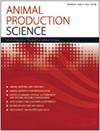新西兰商业马生产4:新西兰生产系统对福利的影响
IF 1.2
4区 农林科学
Q3 AGRICULTURE, DAIRY & ANIMAL SCIENCE
引用次数: 0
摘要
本文章由计算机程序翻译,如有差异,请以英文原文为准。
Commercial equine production in New Zealand 4: welfare implications of the New Zealand production systems
From racehorses to family pets, equine production and management is primarily pasture-based in New Zealand. Pasture-based equine production systems largely re fl ect the horse ’ s ecological niche and have a unique set of management and welfare challenges. This review examines the potential welfare issues related to the management of horses in New Zealand. The economic value of horses varies greatly depending on their usage, which covers a wide spectrum from pest species (e.g. feral horses) to production (e.g. racehorses) and companion animals (e.g. leisure and sport horses). The view of where the horse is positioned on this spectrum may cause differing welfare threats to horses, due to the economic considerations, which drive the majority of welfare and managementaldecisions.The organisation,management,racingandwastage metricsoftheThoroughbred racehorse industry are well documented, and the bene fi ts of the pasture-based system have become evident through less stressful weaning practices and opportunity for early exercise (which has been associated with longer careers and fewer musculoskeletal injuries). Identi fi cation of equine-welfare research priorities in New Zealand remains challenging, given the lack of vertical integration of many sectors of the equine industry resulting in fragmented and limited availability of data.
求助全文
通过发布文献求助,成功后即可免费获取论文全文。
去求助
来源期刊

Animal Production Science
AGRICULTURE, MULTIDISCIPLINARY-
自引率
7.10%
发文量
139
期刊介绍:
Research papers in Animal Production Science focus on improving livestock and food production, and on the social and economic issues that influence primary producers. The journal (formerly known as Australian Journal of Experimental Agriculture) is predominantly concerned with domesticated animals (beef cattle, dairy cows, sheep, pigs, goats and poultry); however, contributions on horses and wild animals may be published where relevant.
Animal Production Science is published with the endorsement of the Commonwealth Scientific and Industrial Research Organisation (CSIRO) and the Australian Academy of Science.
 求助内容:
求助内容: 应助结果提醒方式:
应助结果提醒方式:


